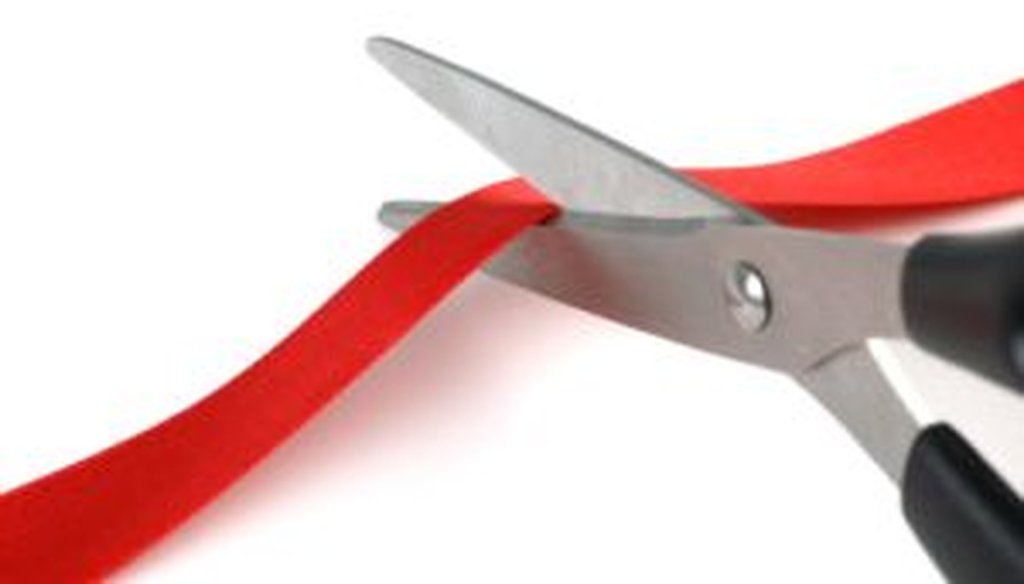Stand up for the facts!
Our only agenda is to publish the truth so you can be an informed participant in democracy.
We need your help.
I would like to contribute

Has runaway federal red tape held back the nation's economic recovery? Maybe, but economists aren't so sure.
Has over-regulation held back the nation’s economic recovery? It’s a claim that politicians -- particularly pro-business conservatives -- periodically make, most recently Sen. Ron Johnson, R-Wis., during a March 10, 2013, appearance on ABC’s This Week with George Stephanopoulos.
Johnson’s comments on This Week were partly obscured in the cross-talk with other panelists, so we decided not to put his statement on the Truth-O-Meter. (His spokesperson said he was talking about regulations as well as taxes and penalties, but that isn’t verfiable from the footage.) Still, we wondered whether his claim that regulation played a role was well-supported, so we checked with a range of economists.
We found several said new regulations had a role in slowing the nation’s historically weak recovery since the last recession -- but most agreed that it was a minor factor at best.
A paper by Steven Globerman, a professor of international business at Western Washington University, provides some of the strongest circumstantial evidence. His 2012 paper didn’t look specifically at the question of whether regulation slowed the recovery, but it did scrutinize two closely related issues: whether the degree of business regulation in the United States has risen in recent years compared to its advanced-industrial rivals (it has, the paper says), and whether this rising tide of regulation is holding back U.S. competitiveness (ditto, according to the paper).
Globerman’s paper concluded that there’s "strong support for claims that the growing complexity and uncertainty of the U.S. regulatory environment is harming the international competitiveness of the U.S. economy." In an interview, Globerman said deregulation contributed to faster economic growth in the United States than in other advanced industrialized countries during the 1990s.
Lawrence J. White, an economist at New York University's Stern School of Business, added that some businesses (though far from all) are more regulated than they used to be. Some portions of the banking sector have become more regulated after the passage of the Dodd-Frank financial services law, he noted. And President Barack Obama’s health care and automotive fuel efficiency initiatives are tightening the rules for their respective industries.
Still, economists we checked with also expressed a fair amount of skepticism. "I think it's fair to say that we don't have any conclusive evidence that the slow recovery is due to regulations," said Tara Sinclair, a George Washington University economist who has written on the question of regulation and economic growth.
For starters, it’s tricky to study the extent of business regulation. The few available measurements, such as how many pages are listed in the Federal Register, are slippery, because it’s not clear whether more verbiage actually equals more intrusive regulation. Also, the degree of regulation varies greatly in the U.S. by state.
Meanwhile, the label "regulation" covers a lot of different rules, some of which are thoroughly uncontroversial, from airline safety rules to bank deposit insurance. The right types of regulations, under the right circumstances, "can help growth" by reducing risks and increasing stability of the markets, said Menzie D. Chinn, an economist at the University of Wisconsin.
Here are some of the other counter-arguments:
• World Bank data shows the U.S. has relatively light business regulation compared to the rest of the world. The most recent findings of the World Bank’s "Doing Business" survey -- which ranks 185 jurisdictions, primarily countries, by the extent of their business regulations -- placed the United States fourth in the world in 2013, the same ranking as 2012. The United States had mixed results on the various factors that made up the total grade, ranging from fourth in "getting credit" to 69th in "paying taxes." But overall, economists consider it a strong showing.
• There are more plausible explanations for the slow recovery. The most recent recession included a partial collapse of the financial system -- a factor that historically makes it harder to mount a quick recovery. Two economists -- Carmen M. Reinhart of the Peterson Institute for International Economics and Kenneth S. Rogoff of Harvard University -- have promoted a widely accepted argument that recessions "associated with a systemic banking crisis tend to be deep and protracted."
There are other, more obvious culprits than over-regulation, economists said. Since the housing bubble burst in 2008, the economy has been weak because, "households lost nearly one-quarter of their net worth, and that depressed their demand for the goods and services that U.S. workers and businesses can produce," said Gary Burtless, a senior fellow with the Brookings Institution.
Indeed, if anything, experts say that relatively lax regulations led to the recession in the first place, including weak oversight of mortgage markets and Wall Street transactions. "Unquestionably, the largest regulatory failure of recent times was the financial regulatory mistakes of the United States and Europe in the late 2000s," said Barry Bosworth, another economist at Brookings. "Countries such as Canada that have more regulation did notably better than the United States."
• The days of rapid growth in decades past coincided with business regulation that in some ways was tighter than today’s. If you’re waxing nostalgic for the good old days of rapid economic growth, you’ll also need to be copacetic with that era’s tighter regulations, ranging from radio and television to telecommunications.
"We had a far more regulated economy in most areas in the 1940s to the 1980s than we do today," said Dean Baker, an economist with the liberal Center for Economic Policy Research. "In banking, not only did we have (the Glass-Steagall restrictions that separated banks and investment banks), but we also controlled interest rates and outlawed interstate banking. The government set airline, trucking electricity and even oil prices. The minimum wage kept pace with productivity growth until 1969. Given the strong growth of this period, you're pretty hard-pressed to argue the case that regulation necessarily impedes growth."
CORRECTION: This article initially reported that economists Carmen M. Reinhart and Kenneth S. Rogoff supported the past two Republican presidential tickets. While Rogoff was an economics adviser to the 2008 campaign of John McCain, the economists wrote jointly in 2012 that "we have not publicly supported or privately advised either campaign."
Our Sources
Ron Johnson, comments on ABC’s This Week with George Stephanopoulos, March 10, 2013
Steven Globerman, "Regulation and the International Competitiveness of U.S.-Based Companies," 2012
Tara Sinclair, "U.S. Federal Regulatory Budget and Macroeconomic Outcomes: What Do We Know?" Dec. 19, 2011
Tara Sinclair and Kathryn Vesey, "Regulation, Jobs, and Economic Growth: An Empirical Analysis," March 2012
World Bank, "Doing Business" summary page for the United States, accessed March 12, 2013
Carmen M Reinhart and Kenneth Rogoff, "This time is different, again? The U.S. five years after the onset of subprime," Oct. 22, 2012
American Enterprise Institute, "Myths of American ‘Cowboy Capitalism,'" March 4, 2013
Steven Strauss, "Actually, Despite GOP Claims -- the U.S. Isn't Over-regulated," Nov. 29, 2011
Bloomberg, "World Bank Ranks U.S. Regulatory Burden Very Low," Oct 20, 2011
American Enterprise Institute, "Small Business, Big Regulatory Burden," Jan. 20, 2011
Email interview with Bruce Sacerdote, economist at Dartmouth College, March 11, 2013
Email interview with Barry Bosworth, senior fellow at the Brookings Institution, March 11, 2013
Email interview with Tara Sinclair, George Washington University economist, March 11, 2013
Email interview with Menzie D. Chinn, economist at the University of Wisconsin, March 11, 2013
Email interview with Gary Burtless, senior fellow with the Brookings Institution, March 11, 2013
Email interview with Dean Baker, economist with the liberal Center for Economic Policy Research, March 11, 2013
Email interview with Steven Globerman, professor of international business at Western Washington University, March 11, 2013
Email interview with Lawrence J. White, economist at New York University's Stern School of Business, March 11, 2013












































